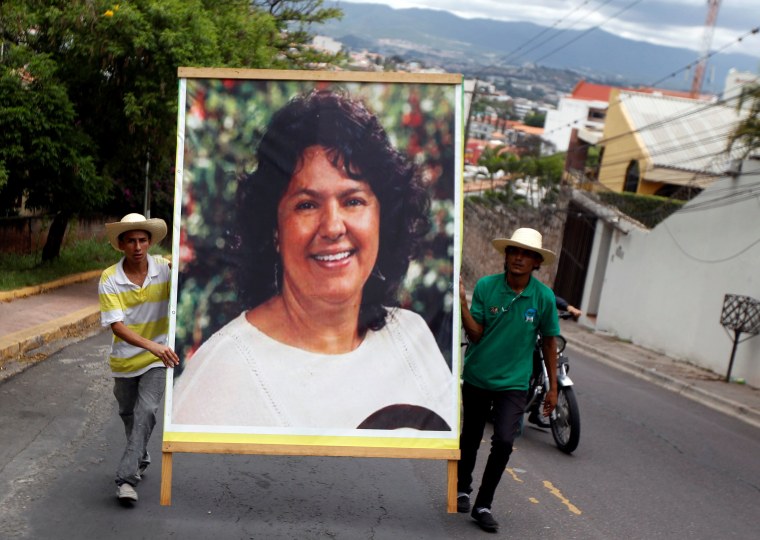An investigation into attacks against Honduran land rights defenders, including the murder of high-profile anti-dam activist, Berta Caceres, has found state authorities routinely failed to investigate or bring perpetrators to justice.
The expansion of mining, agribusiness and energy projects in the Central American country has fueled an "epidemic" of violence against local communities and land rights activists, said the report from the environmental watchdog Global Witness.
The report implicated several top Honduran politicians and business people in a violent crackdown on families who have refused to hand over land.
"Impunity is the oxygen provided to perpetrators by the justice system. Those inflicting violence are not held to account and reports of threats or attacks are rarely investigated," said the report, released on Tuesday.
The Honduran President's office did not respond to requests for comment.
Nestled between Guatemala and Nicaragua on the Caribbean coast, Honduras is rich in forests and valuable minerals, including lead, zinc and copper.
The report investigated the beating, abduction, shooting and imprisonment of several activists battling to protect local land from development for mining, hydro-electric schemes, a new five star hotel complex and logging.
The activists included Ana Mirian Romero and her sister-in-law, Rosaura who were both beaten in 2015 while heavily pregnant after opposing the Los Encinos hydroelectric dam.
Others such as Tolupan indigenous leaders, Armando Funez Medina, Ricardo Soto Funez and Maria Enriqueta Matute were shot and killed in 2013 when taking part in a peaceful protest against the passage of logging trucks through their territory.
While the threats and violence took many forms, the report found that what united all cases was the lack of accountability for the attacks.
"On rare occasions, the gunman is arrested, but those who order the killings are almost never punished - impunity is the norm," researchers said.
Given failures by the authorities to pursue justice, the United States should urgently review its aid policies aimed at supporting rural communities in Honduras, the report said.
In 2016, the United States provided $98.3 million bilateral aid to Honduras and a further $750 million of regional development funds through its 'Alliance for Prosperity Plan'.
"Fifty percent of U.S. direct funding to the Honduran government is in theory conditional on its meeting human rights obligations, including allowing activists to 'operate without interference'" the report said.
Foreign investors and financial institutions should also re-think their investments in Honduras, particularly in mining, logging and large-scale agricultural development - industries often at the center of escalating violence.
"There is a clear and urgent need to refrain from funding or supporting any projects or activities that put defenders at risk." the report said.
Honduras' natural wealth is not widely distributed and Honduras has one of the highest levels of inequality in Latin America, with around six of ten households in rural areas forced to live on less than $2.50 per day.
State institutions have an obligation to consult communities, protect activists and investigate crimes against them, Global Witness said. However this has occurred only on a handful of occasions.
"In the majority of cases, the state turns a blind eye to murder and human rights abuses. In the worst cases, it actively aids and abets them," it said.
"Nowhere on earth are you more likely to be killed for protesting the theft of land and destruction of the natural world than Honduras."
